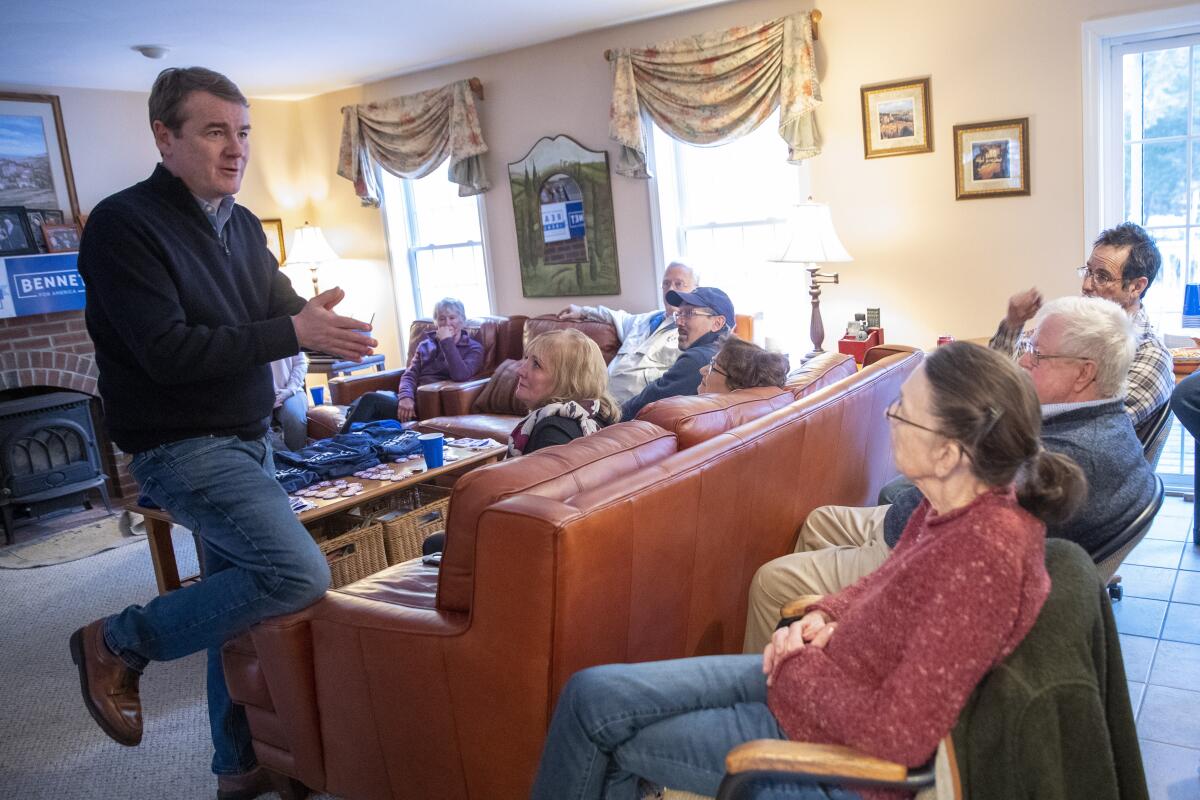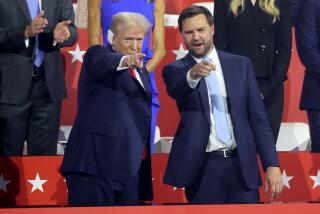‘I’m in this for the long haul’: Michael Bennet, despite low poll numbers, pushes on

NASHUA, N.H. — As party officials in Iowa struggled Monday to report results from that state’s Democratic caucuses, Sen. Michael Bennet (D-Colo.) was busy planning yet another event in New Hampshire, where he will soon hit his 50th town hall meeting.
As the political spotlight shifts east, Bennet, mired in single digits in polls, is all-in here, hoping for a surprising finish — fourth place might qualify — to keep his presidential campaign going.
On a more traditional primary playing field, the still-unsettled Democratic race might provide an opportunity for a candidate like him — if only more voters were seriously considering his candidacy.
So far, that hasn’t happened. With former Rep. John Delaney’s announcement last week that he was suspending his presidential bid, Bennet’s is among the most quixotic efforts of any contender left in the race.
And, yet, driven by some combination of stubborn belief in his own argument, hope and the unique form of gratification public figures get from expressing their ideas to a crowd, Bennet soldiers on, the epitome of the back-of-the-pack candidate who insists that he’s just one lucky break from cracking through.
“It’s been tough from the very beginning,” Bennet said from the driver’s seat of a rented minivan on a recent swing through the state.
“I’ve always believed if I could get in front of people, we would do well, and I’ve always thought my profile was one [that] would wear well with people in Iowa and New Hampshire and up against Donald Trump. But, it has been a struggle all the way along to try to get enough octane for people to pay attention.”
In this long, strange primary season, one marked by the Democratic electorate’s post-2016 PTSD, by voters’ internalization of polling and punditry and their still unfulfilled desire for a nominee who looks like a sure bet to beat President Trump, Bennet has somehow outlasted several fellow senators.
Sens. Kamala Harris of California, Cory Booker of New Jersey and Kirsten Gillibrand of New York are all gone. A liberal star of the last two years, former Rep. Beto O’Rourke, bowed out months ago.
Bennet is still here.
While the front-runners focused on Iowa, he kept his operation small and hunkered down in a state where grass-roots campaigning and independent-minded underdogs have a history of being rewarded. This weekend, he plans to bring James Carville, who 28 years ago guided another unlikely Democrat, Bill Clinton, to the White House and is now Bennet’s most high-profile endorser, with him to the state, hoping for some magic to rub off.
After flying (commercial) to Manchester during a recent break in the Senate’s impeachment trial, Bennet woke up early, ducking through a Renaissance fair that had taken over his hotel, and drove into snow-filled woods to film a television ad that constituted his argument to voters, declaring himself “the candidate who can actually beat Trump” and “experienced enough to know how to get the job done.”
His crowds have grown in recent months. But, still, his best showings in any poll have been two recent New Hampshire surveys that both had him at 2%.
Richard Schwartz, one of 150 people attending a recent Bennet town hall here, voiced the view of many Bennet admirers as he expressed frustration with “a screwed-up system” in which “some of the best ones have not gotten traction.”
“I am not going to rule out voting for him on the grounds that he’s so far behind,” he said. “A candidate who gets a last-minute bump in New Hampshire, even if they finish third or fourth, if they crack double digits, that gets noticed.”
Others have made a different calculation. For months, Bennet courted Bill Shaheen, a prominent New Hampshire activist whose wife, Sen. Jeanne Shaheen, is seeking reelection in November. In late January, Shaheen called Bennet’s team to say he was endorsing Biden, citing a head-over-heart calculation.
“It really was between Joe and Michael Bennet. But I had to win this,” Shaheen said. “It’s time to fish or cut bait.”
A determined focus on an early-state electorate, at least for a candidate lacking an established national profile and fundraising network, seems a less viable strategy this year than it might have been a generation ago. Former South Bend, Ind., Mayor Pete Buttigieg’s staying power among the top tier of candidates offers this election cycle’s chief exception to the rule.
Delaney, for instance, held 266 events in Iowa over 99 days, by far the most of any candidate, and aired more than 3,000 television ads in the state. He pumped $24 million of his own money into his campaign. To no avail.
“It is clear that God has a different purpose for me at this moment in time,” he said in his statement quitting the race.
But a certain kind of voter is still willing to listen to long shots.
Sitting around a Manchester living room, some nodded in agreement as Bennet delivered an impassioned, earnest pitch for his agenda, which he argued is achievable, progressive and broadly supported: a public option for health coverage, but not “Medicare for all”; new investments in infrastructure and early childhood education; and framing “an enduring solution” to climate change as “the way to drive economic growth.”
“My Medicare X bill is supported by 70% of the American people,” he said, contrasting it with the Medicare-for-all proposals from Sens. Bernie Sanders and Elizabeth Warren. “Bernie and Elizabeth’s plan is supported by 30% of Democrats.”
George Bruno, a former ambassador who attended the event and remained undecided, came away impressed. “I appreciate his intellect and temperament, and I think he’d be a fine president,” he said.
“He’s very aware of the problems that are facing the country in a realistic way,” said Rita Broderick of Manchester, who’s also undecided and considering Bennet. “He certainly deserves to be in that upper tier.”
But those who spoke glowingly of Bennet after he left said only that they would consider casting their votes for him, not that they’re locked in.
Unlike senators who ended their campaigns to avoid the embarrassment of missing the cut for a debate or a low finish in their home state, Bennet sees little downside in a disappointing finish, viewing his candidacy as an experiment of sorts.
“Can somebody with less of a profile or ... more of a mainstream agenda win?” he said. “I don’t know the answer to that.”
At some point, he insists, an argument like his will resonate. Political leaders need to look beyond the immediate election cycle, he says.
“If you accept our politics as a two-year proposition, you have to accept that democracy can’t solve climate change. I don’t believe it,” he said.
“That’s why this is so hard. That’s why this doesn’t fit on a bumper sticker,” he added. “This isn’t about a slogan, but it is about the fundamental nature of our democracy.
“That’s one of the reasons I’ve stayed in the race,” he said. “One way or another, I’m in this for the long haul.”
Times staff writers Janet Hook in Washington and Seema Mehta in Des Moines contributed to this report.
More to Read
Get the L.A. Times Politics newsletter
Deeply reported insights into legislation, politics and policy from Sacramento, Washington and beyond. In your inbox three times per week.
You may occasionally receive promotional content from the Los Angeles Times.











